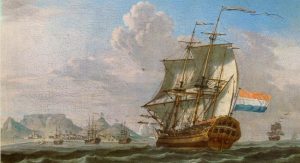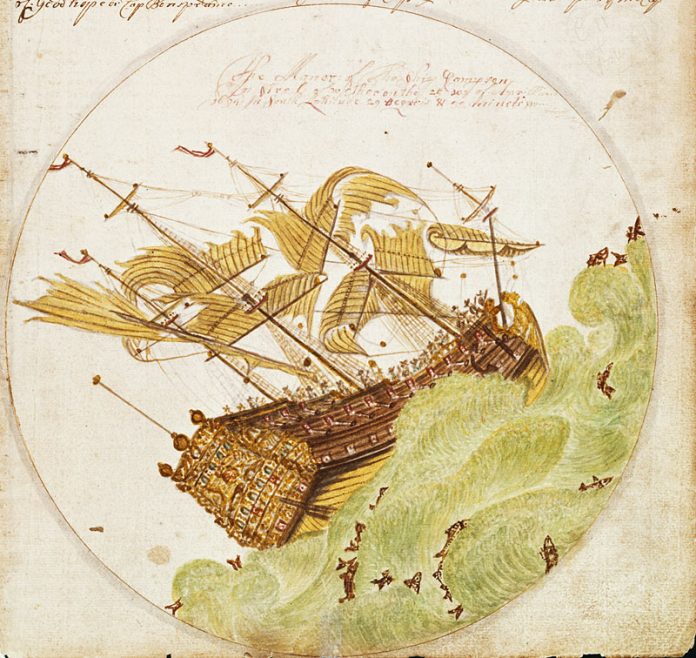Many people in Manchester will have heard the name of Edward Barlow, Ambrose Edward Barlow, born at Barlow Hall, now Chorlton Golf Club, martyred for his Catholic Beliefs in 1641 at Lancaster.
But there is another Edward Barlow, born just a year after the death of Ambrose, whose life path would take a very different path. This Edward Barlow born in Whitefield in 1642 and who sailed the seven seas between 1659-1703.
We know of his life because he kept a journal and it is unique in that it is as far we know the only narrative from an ordinary sailor in the restoration period who worked his way up to be captain of a merchant ship.
One of six children, his father was a farm labourer and the young Edward supplemented the family income fetching horse loads of coal for which he received 2d per load. He tried his hand as a farmer’s boy, a bleacher in a cotton mill According to his journal, he told his friends at the age of sixteen that they would see him no more during one holiday.
Thinking that he was bluffing, he proved them wrong, putting on his best clothes and running off to sea. His journal pictures the scene, in one of its early entries, entitled running away from my father’s house in the Whitefeld, his mother stands beckoning her hand calling him back.
He became an apprentice seaman on board HMS Naseby, the flagship of Admiral Montague
He appears to have travelled the world, fighting against Barbary pirates under the command of Lord Sandwich in 1661 and fighting the Dutch off the coast of Lowestoft in 1665, when the Dutch flagship famously blew up, a campaign brilliantly depicted by Barlow in his journal by a magnificent water colour of the scene.
He travelled to Brazil, Portugal and China, served as a merchant on an East India Company boat and carried herring from the Clyde to the Mediterranean
He was captured by the Dutch in Batavia, (modern day Indonesia) in 1673, which is where he wrote up the first installment of life story brought home in a leaky Dutch vessel . Three years later he is in Marseille over Christmas where he writes:
Having put all our goods on shore that we were to deliver [to Marseilles], we walked ashore being Christmas, to take our recreation and see all about the town, which is a place of very good buildings and a pretty large town or city, where all things are very plentiful, both for meat and drink. They have a very good wine of several sorts and very cheap, especially a red wine, which is a king of wine much like to claret, only a clearer red and better wine to drink.”
 Food often featured in his diary, whilst a prisoner of the Dutch he wrote that “instead of good pies and roast meat, we were content with a little boiled rice and a piece of stinking beef, which they gave us three days in the week, and a quart of stinking water to drink for a day, the weather being exceeding hot.”
Food often featured in his diary, whilst a prisoner of the Dutch he wrote that “instead of good pies and roast meat, we were content with a little boiled rice and a piece of stinking beef, which they gave us three days in the week, and a quart of stinking water to drink for a day, the weather being exceeding hot.”
While he also gives a lesson in the eating of turtle eggs
“[Turtle’s] eggs are not so good as the flesh of them, it being very good and wholesome and very sweet, making excellent good broth. Their eggs are not like hens” eggs, but are as round as a ball, and their shell is white, and a kind of tough thick skin over them, but when the shell is dry it will break like another egg shell
Man overboard was an oft heard cry about the ships and Barlow would often write of such occurrences
it [was] blowing pretty hard and some of our men going up into the foretop to reef our fore topsail [reduce its size to increase stability of the ship], a young youth fell from the fore topsail yard into the sea, and was drowned, yet he could swim pretty well, but the ship driving away, and hoisting out ye boat, and it blowing very hard, the boat looked for him but could not find him, for the waves running high had swallowed him up and he was lost.”5
He would often comment on the differing nationalities that he met, the men of Lisbon were according to him “fiercely jealous and would not allow any stranger to come close to their wives”.
Nor did the Spaniards allow their wives any freedom.The men “ were very proud, even if not worth a groat and with hardly victuals to put in his belly, yet he will have asword by his side and a cloak upon his back.”
The 225,000-word journal, preserved in a joint of bamboo sealed with wax from the rigours of shipborne life, in some ways paints a dark picture of life on board a seventeenth century ship, the suffering of hunger, violent punishments, and fundamental lack of liberty. “ The best literary study of Barlow’s journal classifies him as an outstanding example of the mobile consciousness of early modern England’s working poor”, wrote Steve Mentz.
Indeed Edward would in his journal, advise young men to follow any trade apart from going to sea where they would suffer, “ abuse, hardships and a life little better than a slave going with many a hungry belly and a wet back.” .He added that the injustices made England the worst kingdom in all of Christendom for seaman.
Yet we should not forget the magnificence of the journal, Barlow improved as an artist as the years went on, sketching and later using watercolors to depict harbours, ships and animals. He appeared to enjoy depicting wildlife in particular, drawing a shark which he describes as the most “ raucous fish that swims in the sea.” He would draw gulls catching flying fish as well as an elephant and a Rhinoceros.
How the journal came to be published is something of a mystery.It was written neatly on foolscap sheets and transcribed and edited by Basil Lubbock who boiught the mauscript from the Earl of Hardwicke. It had previous to that resided in the library of Sidney Lodge in Hampshire, once the home of vice admiral Sydney Yorke but the family had no idea how the manuscript had come to be there.
Some have claimed that it is fake, questioning how an untutored sailor could have taught himself to write, been supplied with all the ink and kept in such good condition while at sea.Experts have studied it and believe it to be genuine, its style of writing consonant with that of contemporary sea journals.







